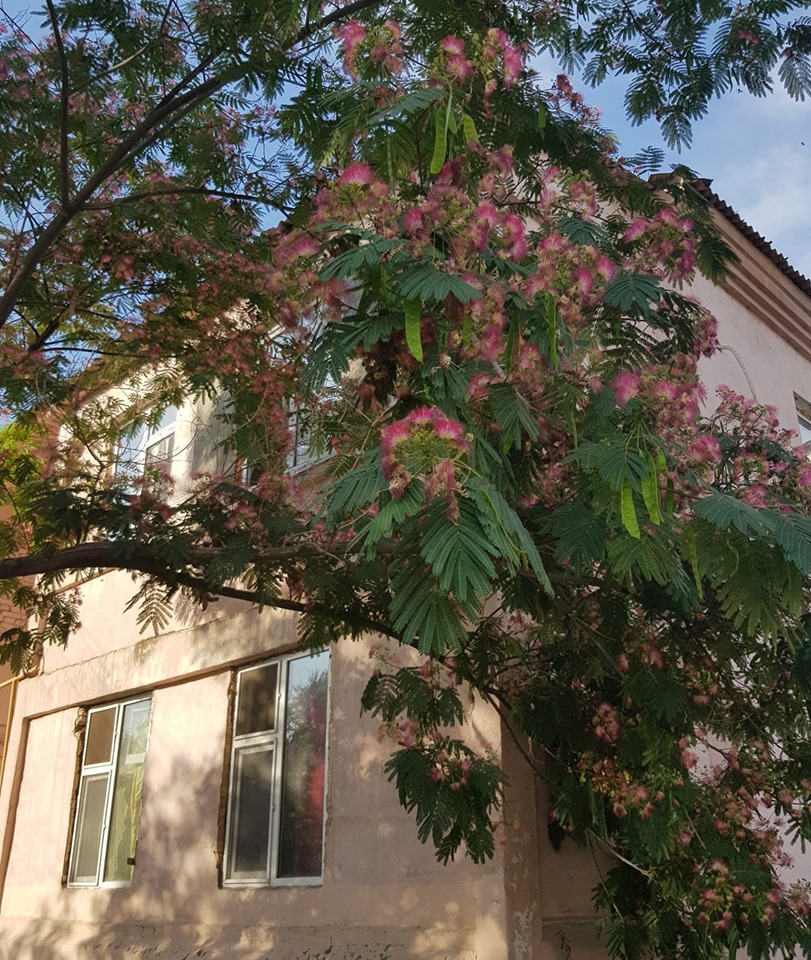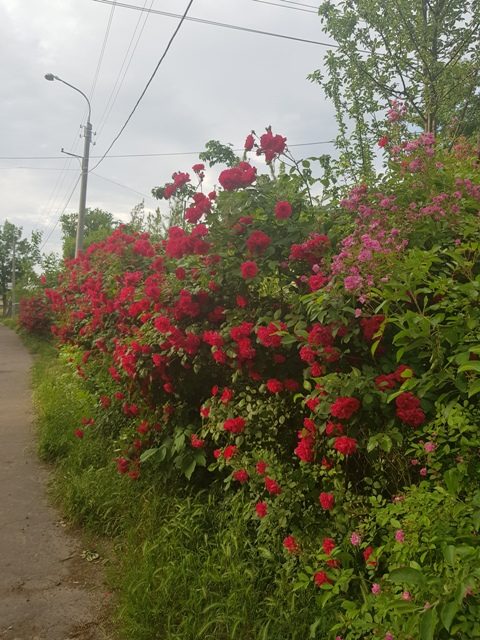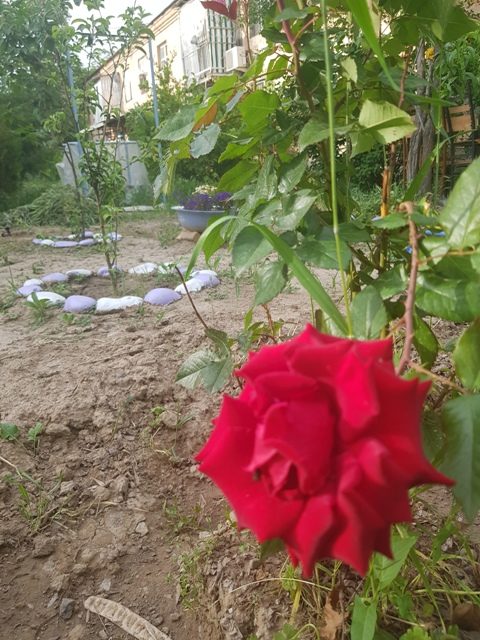The Neighborhood that Smiled Because of Quarantine
(short story by Azam Abidov)
If you peep at the neighborhood across the street, where, according to rumors, the mafia-king and the richest man of the city lives, you will see yourself in the Soviet era. But I always think differently. A simple example: can the person driving through the only street leading to his house, which has become miserable and bumpy without seeing asphalt since the Soviet era, be called a rich man? No, I don’t think so. Moreover, rich people pass by this street every day, driving their foreign-produced magnificent cars, and the restaurant on the edge of the street belongs to the first leader’s son-in-law. Do they ever draw any exemplary conclusions from the recent past? Well, this story is not about them, but actually about the people and the neighborhood, where more than 50 two-story comfortable brick houses were built in the sixties.
 Two years ago, I accidentally fell in love with this cozy part of the city because of the pretty plane trees and oaks that were planted along the long road. When I came to see an apartment in one of the two-storey buildings next to the school, I wondered since it was too unpresentable, but I consoled myself saying that there is always a chance to improve the worst place. Besides, my kids have grown up and we needed another flat, since I couldn’t afford a bigger house. And that was an area not far from my first two-room flat where we lived, and one could reach this new place in a short time running through the Besh-Buloq neighborhood stretched along the railway line.
Two years ago, I accidentally fell in love with this cozy part of the city because of the pretty plane trees and oaks that were planted along the long road. When I came to see an apartment in one of the two-storey buildings next to the school, I wondered since it was too unpresentable, but I consoled myself saying that there is always a chance to improve the worst place. Besides, my kids have grown up and we needed another flat, since I couldn’t afford a bigger house. And that was an area not far from my first two-room flat where we lived, and one could reach this new place in a short time running through the Besh-Buloq neighborhood stretched along the railway line.
In this new neighborhood, my former neighbor worked in a flea bazaar, feeding his family of five from his daily income, and every time when he got into a fight with his wife, he immediately took refuge in the basement. By the way, only two of the many residential houses in the area – one was ours – had a basement, which was a kind of spacious, low-rise room. My neighbor was heavily in debt for electricity, gas, and water, and when he finally sold his flat in the fall, he whispered to the new flat owner, who is now my new neighbor, that the basement all belongs to him. I did not want to argue with anyone in order to get all the parts of the basement; it was enough for everyone; although earlier I wrote a letter to the district administration and took a letter of consent to reorganize the basement into a mini-library.
 While there were not many lovely trees along the main road in the neighborhood, it was so beautiful in the spring because of the fruit trees and overgrown wild greens clung to wire and iron fences in the tiny yards in front of the houses. Especially, on the way out to the store, tall, tree-like white and red roses at a distance of about 100 meters planted by a nature-loving neighbor of mine were my favorite! I have never seen such a beautiful pavement of flowers, even in Amsterdam!
While there were not many lovely trees along the main road in the neighborhood, it was so beautiful in the spring because of the fruit trees and overgrown wild greens clung to wire and iron fences in the tiny yards in front of the houses. Especially, on the way out to the store, tall, tree-like white and red roses at a distance of about 100 meters planted by a nature-loving neighbor of mine were my favorite! I have never seen such a beautiful pavement of flowers, even in Amsterdam!
So in two years we have lightly renovated our rooms, my sons and I have repaired old asphalt road starting from our house to the school fence; the house has been painted white, the porch has been restored, but we have not been able to completely renovate the slate roof, so moisture, not leak, was felt during heavy rain on the ceiling of my balcony. The organization responsible for all this had only a table and a chair, where an unshakable frowning fat man who could only write a bill for payment sat all day long. “Now it is not the time to hope for anyone at all; believe in your own strength and just move forward!”– was my motto! Sincere volunteering was not even a dream of the locals: the district policeman who lived right next to my house drove past the freshly laid concrete in his car despite the “Caution!” sign. Or my neighbor downstairs, who did not want to join us in the repairing process, just intervened, ordering, “This is how this place should be done! Or this is how it should be painted.” Two days after we planted the seedlings in our open small yard, someone pulled them out at night.
I just calmed down, repeated Astagfirullah, and saved my nerves. I installed a low fence in my yard, a horizontal bar and a seesaw for the children, replanted flowers, seedlings and basil, and made room for my car under the balcony. I swept the common porch myself every two days and washed the floor, ignoring the strange look of the young brides and tenants – my neighbors. Carrying a bowl of hot food, I did not hesitate to visit my Armenian woman-neighbor or a sick Jewish man, who had a broken leg. When Aunt Malika, a seventy-year-old woman from the next house, looked behind the fence and said, “Our neighborhood needed a man like you,” I felt shy, but I actually was very much inspired and quickly helped her cut off the wind-broken mulberry-tree branches and dragged them to the big trash can. It was as if everything was in order, but in fact it was not so good in here.
Hundreds of people of different nationalities lived in this neighborhood: old Russian women with shawls on their heads; tall, skinny, shaved old men; mustached dads with caps; several disabled children who went out to play from time to time; arrogant and crooked boys smoking cigarettes; and young girls with red lips wearing shorts – most of them were those who could not leave to Russia or other countries in its time and also their descendants. However, with so many people around, there was no one who laughed or smiled, and everyone was very serious, gloomy and frown.
 Dozens of foreign artists, all from Europe and America to India and Australia, came to my apartment over the past two years to enjoy, laugh and dance. I was dreaming to buy the whole building and turn it into a nice creative writing residency! But there was no change in the faces of my neighbors: no one smiled or pretended to be laughing, or never showed their smile.
Dozens of foreign artists, all from Europe and America to India and Australia, came to my apartment over the past two years to enjoy, laugh and dance. I was dreaming to buy the whole building and turn it into a nice creative writing residency! But there was no change in the faces of my neighbors: no one smiled or pretended to be laughing, or never showed their smile.
 It really smelled like Soviet years. If you moved through the two-storey buildings around, at least poorly painted windows or windowpanes would evoke the imagination of those times. Rotten, rusty cars like Moskvich or Jiguli, balloons with planted flowers, dark brown, unlocked half-open doors, black hoses stretched out like snakes in the yards, moldy brick walkways, open hanging balconies covered with tin, cracked walls, low barns in front of the houses full of junk, broken, crumbling plywood, thick web-covered thousand-year-old porch ceilings – oh my God, a man like me would enjoy seeing them all!
It really smelled like Soviet years. If you moved through the two-storey buildings around, at least poorly painted windows or windowpanes would evoke the imagination of those times. Rotten, rusty cars like Moskvich or Jiguli, balloons with planted flowers, dark brown, unlocked half-open doors, black hoses stretched out like snakes in the yards, moldy brick walkways, open hanging balconies covered with tin, cracked walls, low barns in front of the houses full of junk, broken, crumbling plywood, thick web-covered thousand-year-old porch ceilings – oh my God, a man like me would enjoy seeing them all!
As I settled there, I kept greeting everyone warmly, but when I spoke with my neighbors I didn’t see smiling faces in return. However, the situation began to change slowly: people stopped looking at me as a stranger or suspicious new neighbor. My neighbors began to talk a little more openly. When I found out that Yura, a young man who could not stop himself from drinking for at least a week, was a master of flowers, I did not let him stay without work. I paid him in cash for his work and he opened a small window in our basement, made shelves for books, fixed the fan, installed a laundry machine in the house, and built an alcove out of old iron chairs in the yard. Of course, he did not give up drinking completely, or pray along with me, but his mother and family were very pleased to see that he has become a better man.
Now there are not people outside during quarantine. When I went out to the small garden to water flowers and read books, sometimes my neighbors passed by, they enjoyed seeing me plant different flowers in old pots and buckets, some of them took pictures on their phones. Last week, I saw my neighbor downstairs shovel the ground in front of his window, sow the seeds, plant basil and pour water; the other man in the other house was clearing the weeds; and a woman next door was planting flowers in her yard. Igor, a young man who was trying to sell his three-room flat, which had never been renovated, was passing by yesterday. “Come on, brother,” I called him. “Please make your porch a little deeper, there’s lime and paint in the basement, use them as you wish and don’t let anyone who comes to see your flat sniff because it is stinky,” I said to him friendly. He accepted my request unwillingly, but accepted and I am sure he would be able to sell his flat soon.
And today a miracle happened in our neighborhood! I was watering young persimmon-trees planted before the quarantine when Uncle Ivan, who lived next door and who showed himself out once a month, passed by. He was called a good gardener, and I could not find him in his one-room flat on the second floor several times before, since I wanted to ask for his advice in the spring to beautify my small garden. Every time when I knocked on his slightly open door, there was no sound, it was clearly seen a big mess in the room, and the smell of the old days wafted through my nostrils. Today, he was wearing a hat on his head, a long-sleeve flowered shirt, and white sneakers on his feet. He was the only old man in the neighborhood who did not like to shave his beard and his back hair grew longer.
 “Dyadya Vanya!” I called him. He turned slowly and came closer to the fence. “What are you doing?” I asked.
“Dyadya Vanya!” I called him. He turned slowly and came closer to the fence. “What are you doing?” I asked.
“Oh, hi, how are you? I’m walking around the house, I’m bored at home,” said Uncle Ivan.
“Where’s your mask?”
“I’m not going far, I’m just walking around.”
“No,” I said. “You can’t walk without a mask. Wait a minute!”
I looked at the second floor balcony and called my son: “Sonny, please throw me one of the funny masks with smiley-face emoji we bought the other day!”
As I grabbed the face mask, I handed it to Uncle Ivan to wear. Grandpa Ivan took it and put it on his face, then looked at me. “Nice!” I gave my thumb up.
At that moment Dyadya Vanya’s face lit up, first a faint grin, then a smile spread all over his face, then a very, very beautiful smile! I bet I had never seen such a nice smile before! Uncle Vanya’s tiny yellow teeth, his dispersed hair, worn-out clothes, and especially his hat, matched this bright smile so well! The first smile really matched this neighborhood and it was worthy of it!
At that moment, Auntie Faya, an old Tatar woman who lived five or six houses away, passed by.
“What are you wearing, Vanyusha?” she asked, glancing at the Uncle Vanya.
“Did you like it? I have it for you too, auntie!” I replied instead.
My son quickly passed another mask and Auntie Faya also put on a smiley mask.

“Am I looking funny?” she asked and even without waiting for our answer she laughed out loud like a young woman.
“Oh my God, it’s easy to make these people laugh, oh, they also smile and laugh after all!” I was very, very happy. I had a bunch of red roses in bloom, and I immediately cut one and handed it to Uncle Vanya.
“Please give it to Auntie Faya!” I said, my eyes burning.
“Oh, thank you! Thank you, Vanya!” Auntie Faya smiled even more beautifully as she picked up the rose from the old man. “I knew, yes, I knew you always had sincere sympathy to me, Vanyusha!”
There was no greater joy for me in this world at that moment! I wanted to walk around the house with Uncle Vanya, then go up and clean the dust and dirt in his flat, and wash moldy dishes. Then I would put him in the bath, fix his hair and beard, wash his body thoroughly, and put on clean clothes. All I wanted from him was to smile and spread a beautiful, bright smile in the neighborhood! Yes, I will do that! Auntie Faya also lived alone. But I couldn’t do it that way with her. I’m ashamed. On top of that, she was a religious woman who kept her house clean and herself neat.
May, 2020




